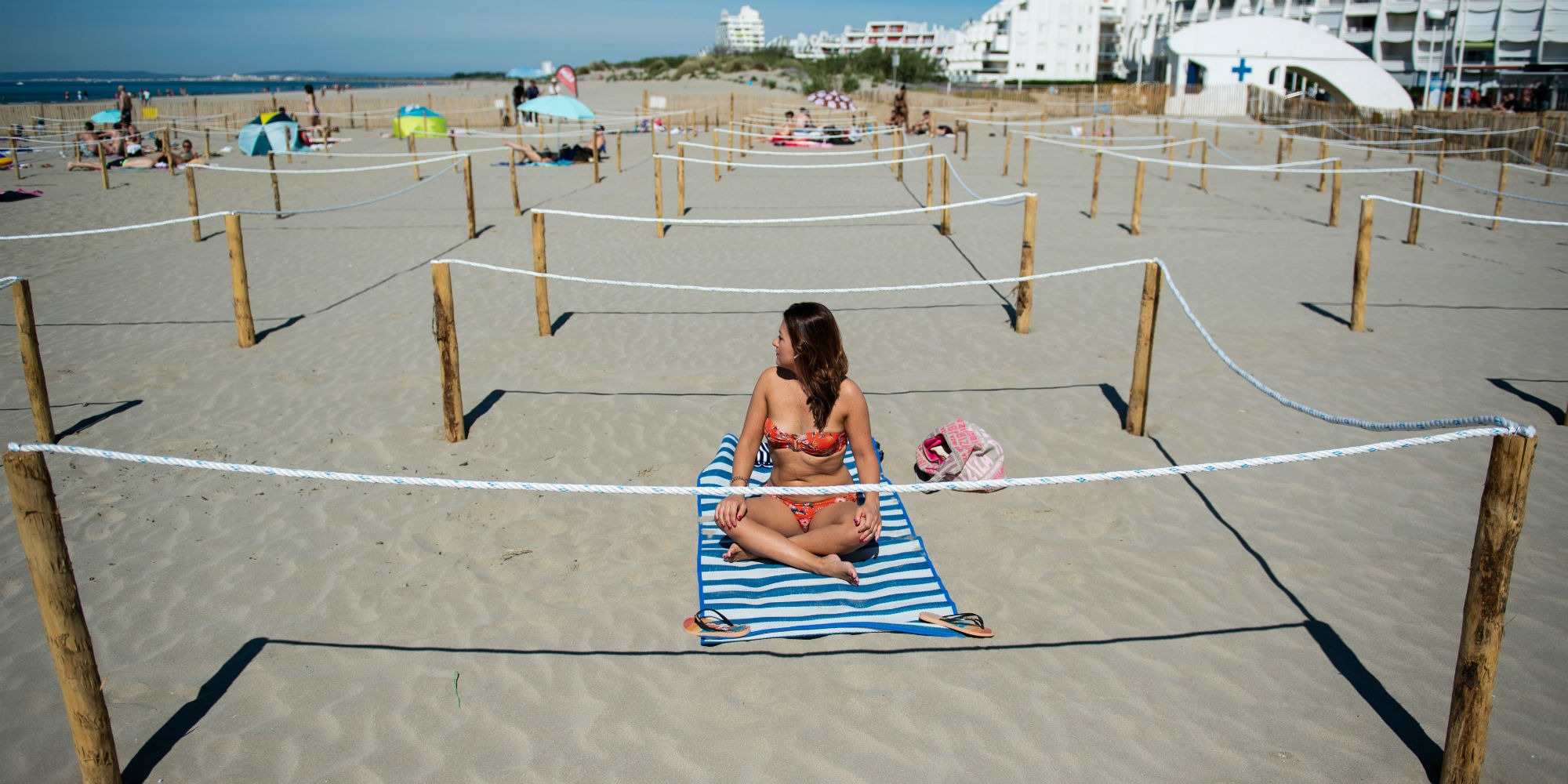The French should be able to go to the beach this summer. But like in many other areas, the coronavirus will change some habits. Sanitary measures oblige, no question this year to see his napkin stuck to that of a stranger for long hours, or even to enjoy the terrace of a beach bar less than a meter from another table. In "La France Bouge", Elisabteh Assayag and her guests highlight several initiatives that will allow them to go and relax in the sun, while respecting the rules of social distancing.
>> LIVE - Coronavirus: follow the evolution of the situation
Reserve your sandbox
Bathing suit, cream, flip flops and towel over your shoulder, you're ready to enjoy the beach. But have you thought about reserving your pitch? You may be obliged to do so if the town hall of your seaside resort has decided to call on Elloha, a company which has set up a reservation application dedicated to sandbands. "The idea behind this application is to avoid a rush on the beach", explains to the microphone of Europe 1 Bernard Langlais, the deputy director of the company.
With this application, a "town hall will be able to decide which areas of its municipality are dedicated to the 'relaxation beach', define time slots, and even the number of people," he explains. There will therefore be "a determined stock of marked places", thus making it possible to have "a serene beach where distance is respected". Once the reservation is made, all you have to do is present your confirmation SMS at the beach entrance or during an inspection.
CORONAVIRUS ESSENTIALS
> Coronavirus: "We can largely release the pressure", according to an epidemiologist
> Coronavirus: the situation is "getting worse" worldwide, according to the WHO
> Economic crisis: "There will be two shocks, one on unemployment and one for young people"
> The rant of the pedagogue Philippe Meirieu against the distance school
> Coronavirus: 5 mistakes not to make with your mask
> It's a good time to take a flight to Europe!
Beach huts that do not necessarily have sea views
If you go to a beach with cabins, your habits may also be upset this year. This is particularly the case in Dunkirk, where the town hall has decided to set up a strict health protocol for its "kiosks". First of all, the rental is no longer by the day, but "by the fortnight", indicates to the microphone of Europe 1 Patrice Vergriete, the mayor. A choice motivated by the necessary disinfection between two rentals.
But the city councilor has also set up a "cross system" to avoid proximity to neighboring cabins. "On even days, the cabins with an even number will be able to watch the sea. On other days, holidaymakers will watch the seawall and the onlookers who walk there," he explains. Turning your back to the sea half your vacation is certainly not ideal, but the mayor highlights the health need. As for booking a cabin, it is now done online to avoid "queues". Despite these measures, Patrice Vergriete assures that already 250 vacationers have appeared within 48 hours of the opening of reservations.
>> PODCAST - Coronavirus: find all the answers to your questions here
Rigorous distancing in beach bars and restaurants
After several hours in the sun, you will surely want to go hydrate yourself or go for a bite to eat in one of the bars and restaurants that are on the beach. But here too, sanitary measures are essential. To ensure that the protocol is well respected, "the town hall of Cannes has decided to redirect its hygiene and health service to help restaurateurs and beach owners to put these measures into practice very concretely", explains to the microphone of Europe 1, Thierry Migoule, the director of cabinet of David Lisnard, mayor of Cannes.
Distance between the mattresses and other deckchairs, but also between the tables of the restaurants that have their feet in the sand, everything is planned to "ensure the safety of customers and tourists", including "a thorough cleaning of equipment at each change of customers ". Measures that will necessarily limit the turnover of these establishments, but the town hall has also provided financial measures: "We exempt beach attendants from fees for three months, while we spread other taxes over time."
A new rescue method to limit contact?
Reserve your sandbox, respect the famous meter distance to the bar ... habits will be turned upside down for vacationers and beach-goers this summer. But they are not the only ones: rescuers at sea must also change their method to protect themselves from the coronavirus. How indeed to help someone who is drowning without risking contamination? This is the question to which Jean-Luc Bartoli, the head of the beach at Argèles-sur-Mer, in the Pyrénées-Orientales answered.
"When you work on a drowning victim, you end up cheek to cheek, since you have to tow it," he explains. Proximity "necessary to clear the victim's airway" and ensure that "his head is no longer submerged". A period of time during which the head of the rescuer is therefore glued to that of the victim, very far from the meter distance recommended by the health authorities.
The rescuer has therefore developed and tested a new technique which makes it possible to combine the rescue of the life of a drowning person while limiting contact as much as possible, and the idea is very simple: "Put an airbag in the cervical area of the person being rescued so that they are no longer stuck to them. " Thus, "the airways are cleared and the victim heads out of the water". As for the rest of the body, it is kept horizontal thanks to "a tube buoy".

